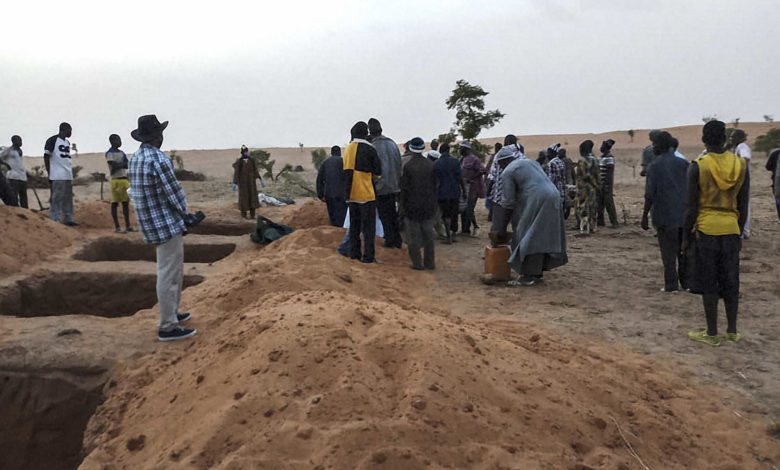Ethnic Tensions Worsen Jihadist Terror Attacks In Mali

It started sometime in 2012 as opposition to the military dictatorship in Mali. There were also citizens’ mobilization against Islamic jihadist fundamentalism.
However, in the course of time with the mix of jihadists, what started as a push for an enthronement of democracy soon turned into an ethnic conflict between the Fulani and the Dogon.
The two ethnic groups occupy the central region of the country and frequently contend over the land space for farming and livestock grazing.
Violent conflicts began to define both groups’ relationship in 2012 ridiculing the traditional justice system which until then made it possible to check inter-community conflicts. Amadou Koufa’s jihadists also took position, escalating the conflicts into a standard insurgency.
According to Adama Diongo, President of the Association for the Integrated and Sustainable Development of the Dogon Country and spokesperson for the Collective of Youth Associations in the Dogon Country, the terrorists are all over Dogon communities.
The state forces have been unable to put the insurgency under control in the past three years and the jihadists have clearly dug in, he said.
“The terrorists were able to reorganize to occupy space. By occupying the area, they easily relate with the Fulani dwellers and have operated repeatedly in the midst of the Fulani and Dogon tribes people,” he said.
The jihadists started by winning people over. But Diongo observes something about that strategy, saying: “As they were preaching to the people, they began to attack the institutions of the state as well as constituted authorities.”
It seemed to work but Dogon hunters quickly stepped in to confront the jihadists. The jihadists attacked the Dogon and it culminated in reprisals. That is how the area became the theatre of conflicts between the Fulani and Dogon tribes, Diongo said.
The jihadist coloration of the conflict started in the northern parts of the country. The major terrorist groups active in the country included Al-Qaeda in the Islamic Maghreb (Aqmi), the Movement for Unity and Jihad in West Africa (Muja), Al Mourabitoune, Ansar Dineiii, and the Macina Liberation Front (Mlf).
In March, 2017, Ansar Dine, Al Mourabitoune, Katiba Ansar Dine Macina and AQIM announced their alliance under the leadership of Ag Ghali.
A conflict taking its tolls on the people
The Dogon-Fulani conflict continues to escalate, inevitably creating serious mistrust and antagonism across ethnic divide.
Diongo assessed the extent of the damage and said: “Today, all populations are victims of this conflict which has lasted for five years in the most affected areas and localities.
“Lots of people are tired and don’t know where to turn. So, they are forced to accept the demands of the terrorists.”
In the central region of the country, the conflict has recently become more fierce than in the northern part where it started. The ethnic conflict is getting bogged down by the day.
“The terrorists are rustling livestock, attacking all the economic mainstay of individuals. They impoverish the people and force them to accept their conditions,” stated an insider familiar with the dynamics of the conflict.
Some analysts are examining the causes of the conflict in the context of national policies.
For instance, Seydou Gana, President of the Circle of Reflection and Action for Development in Mali points to the demographic evolution of the area.
He highlighted the increase in the population of the Peulh and the Dogon and how it has affected their relations.
“These are the small seeds of conflicts that existed between the Dogon and the Fulani which have been exploited by terrorists,” he said.
According to him, the terrorists in order to gain a foothold aligned with and strengthened the Peulhs against the Dogon.
Historically, the two ethnicities lived in harmony. The Dogon farmers live on the cliffs and in the open plains while the Fulani are traditionally pastoralists occupying some areas towards the River Niger.
Following the defeat of the jihadists in 2012 at Konna, they began to look southward, finding Fulani elements crucial in making a foothold in the central region.
Before the arrival of the jihadists, there had not been an incidence of violence between the two ethnic groups.
“This is something that could stop along the way but unfortunately it was made worse by political interference and the speaking out of a number of leaders who fueled the conflict. Unfortunately, we have been the victim of a crisis since 2012.”
It is a crisis which first took shape in the delta (Mopti region) but which has spread to the Dogon country. That is from Bandiagara, Bankass, Koro and Douentza. There has been a resulting massive displacement of people.
The United Nations estimates that there are increasing numbers of the internally displaced persons in Mali. About half of the displaced, or 120,000 people, are believed to be in the Mopti region, the epicenter of conflict.
Support Our Journalism
There are millions of ordinary people affected by conflict in Africa whose stories are missing in the mainstream media. HumAngle is determined to tell those challenging and under-reported stories, hoping that the people impacted by these conflicts will find the safety and security they deserve.
To ensure that we continue to provide public service coverage, we have a small favour to ask you. We want you to be part of our journalistic endeavour by contributing a token to us.
Your donation will further promote a robust, free, and independent media.
Donate HereStay Closer To The Stories That Matter




